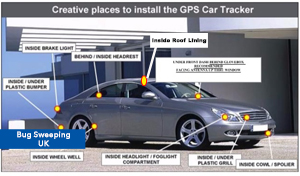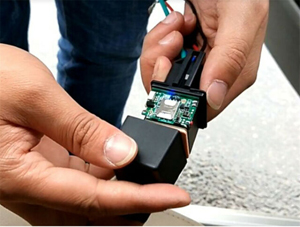GPS Vehicle Trackers - How they Work
GPS Vehicle Trackers - How they Work
Global Positioning System (GPS) is a worldwide radio-navigation system formed from the constellation of 24 satellites and their ground stations. The Global Positioning System is mainly funded and controlled by the U.S Department of Defence (DOD). The system was initially designed for the operation of U. S. military. But today, there are also many civil users of GPS across the whole world. The civil users are allowed to use the Standard Positioning Service without any kind of charge or restrictions.

Global Positioning System tracking is a method of working out exactly where something is. A GPS tracking system, for example, may be placed in a vehicle, on a mobile phone, or on special GPS devices, which can either be a fixed or portable unit. GPS works by providing information on exact location. It can also track the movement of a vehicle or person. So, for example, a GPS tracking system can be used by a company to monitor the route and progress of a delivery van, and by parents to check on the location of their child, or even to monitor high-valued assets in transit.
A GPS tracking system uses the Global Navigation Satellite System (GNSS) network. This network incorporates a range of satellites that use microwave signals that are transmitted to GPS devices to give information on location, vehicle speed, time and direction. So, a GPS tracking system can potentially give both real-time and historic navigation data on any kind of journey.
GPS provides special satellite signals, which are processed by a receiver. These GPS receivers not only track the exact location but can also compute velocity and time. The positions can even be computed in three-dimensional views with the help of four GPS satellite signals. The Space Segment of the Global Positioning System consists of 27 Earth-orbiting GPS satellites. There are 24 operational and 3 extra (in case one fails) satellites that move round the Earth each 12 hours and send radio signals from space that are received by the GPS receiver.
The control of the Positioning System consists of different tracking stations that are located across the globe. These monitoring stations help in tracking signals from the GPS satellites that are continuously orbiting the earth. Space vehicles transmit microwave carrier signals. The users of Global Positioning Systems have GPS receivers that convert these satellite signals so that one can estimate the actual position, velocity and time.
The operation of the system is based on a simple mathematical principle called trilateration. Trilateration falls into two categories: 2-D Trilateration and 3-D Trilateration. In order to make the simple mathematical calculation the GPS receiver must know two things. First it must know the location of the place is to be traced by at least three satellites above the place. Second, it must know the distance between the place and each of those Space Vehicles. Units that have multiple receivers that pick up signals from several GPS satellites at a same time. These radio waves are electromagnetic energy that travels at the speed of light.
A GPS tracking system can work in various ways. From a commercial perspective, GPS devices are generally used to record the position of vehicles as they make their journeys. Some systems will store the data within the GPS tracking system itself (known as passive tracking) and some send the information to a centralized database or system via a modem within the GPS system unit on a regular basis (known as active tracking) or 2-Way GPS.
A passive GPS tracking system will monitor location and will store its data on journeys based on certain types of events. So, for example, this kind of GPS system may log data such as where the device has travelled in the past 12 hours. The data stored on this kind of GPS tracking system is usually stored in internal memory or on a memory card, which can then be downloaded to a computer at a later date for analysis. In some cases the data can be sent automatically for wireless download at predetermined points/times or can be requested at specific points during the journey.

An active GPS tracking system is also known as a real-time system as this method automatically sends the information on the GPS system to a central tracking portal or system in real-time as it happens. This kind of system is usually a better option for commercial purposes such as fleet tracking or monitoring of people, such as children or elderly, as it allows a caregiver to know exactly where loved ones are, whether they are on time and whether they are where they are supposed to be during a journey. This is also a useful way of monitoring the behavior of employees as they carry out their work and of streamlining internal processes and procedures for delivery fleets.
Mobile Phone Tracking
The development of communications technology has long since surpassed the sole ability to access others when they are mobile. Today, mobile communication devices are becoming much more advanced and offer more than the ability to just carry on a conversation. Mobile phone GPS tracking is one of those advances.
All mobile phones constantly broadcast a radio signal, even when not on a call. The mobile phone companies have been able to estimate the location of a cell phone for many years using triangulation information from the towers receiving the signal. However, the introduction of GPS technology into mobile phones has meant that mobile phone GPS tracking now makes this information a lot more accurate.
With GPS technology now more commonplace in many new smartphones, this means that the location of anyone carrying a GPS enabled smartphone can be accurately tracked at any time. Mobile phone GPS tracking can therefore be a useful feature for business owners, parents, friends and co-workers looking to connect with one another. GPS Tracking Apps (www.gpstrackingapps.com) provides a suit of Apps for the iPhone, iPad, Android, Blackberry and latest Samsung operating system all of which can be used to track one another on a location-based social networking portal or from phone to phone.
If you require your vehicle or communications checking for the presence of illicit eavedropping and spyware, call us 07816 477496.
Clients ask us about GPS Trackers?

Is my car being tracked?
Has someone put a tracker on my car?
Have the Police fitted a tracker to my car?
Are the Police tracking my car?
Has an ex partner put a tracker on my car?
How to find a tracker hidden on my car.
Can the Police put a tracker on my car?
Is it legal to track someones car?
If you are asking any of these questions, call us today and we will give you the answers.
Call us on 07816 477496
We offer Free no obligation advice.